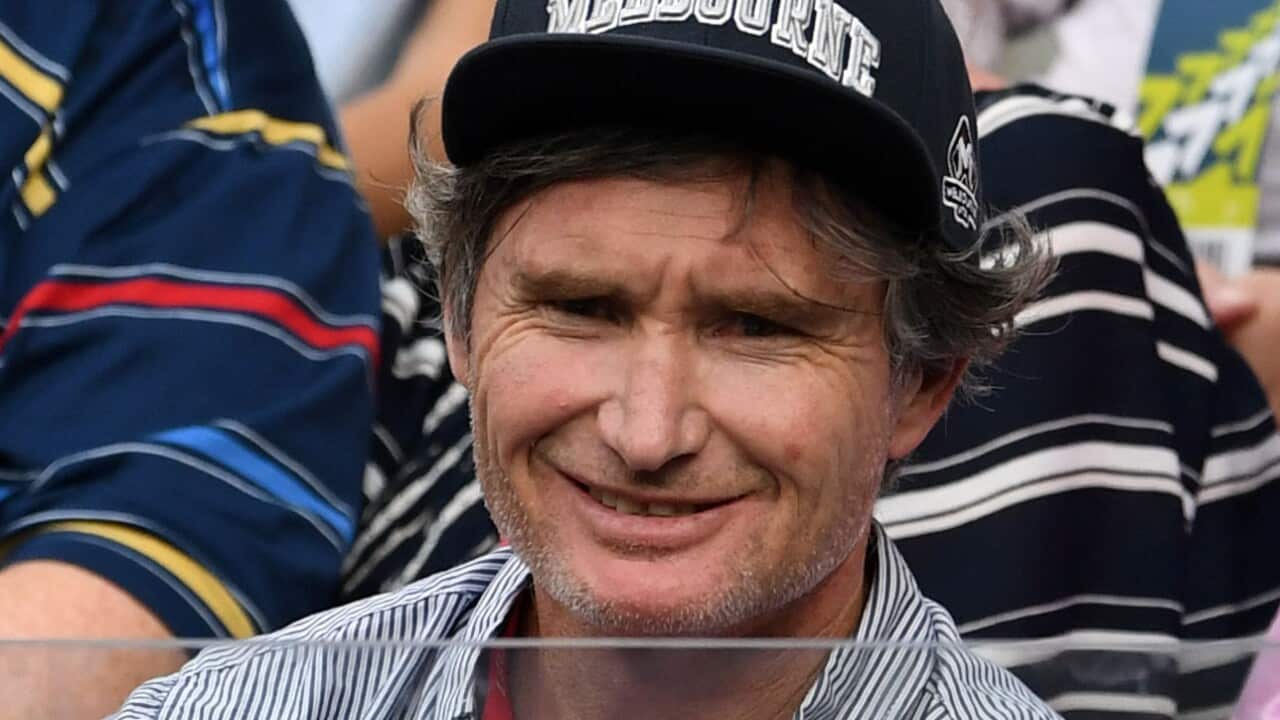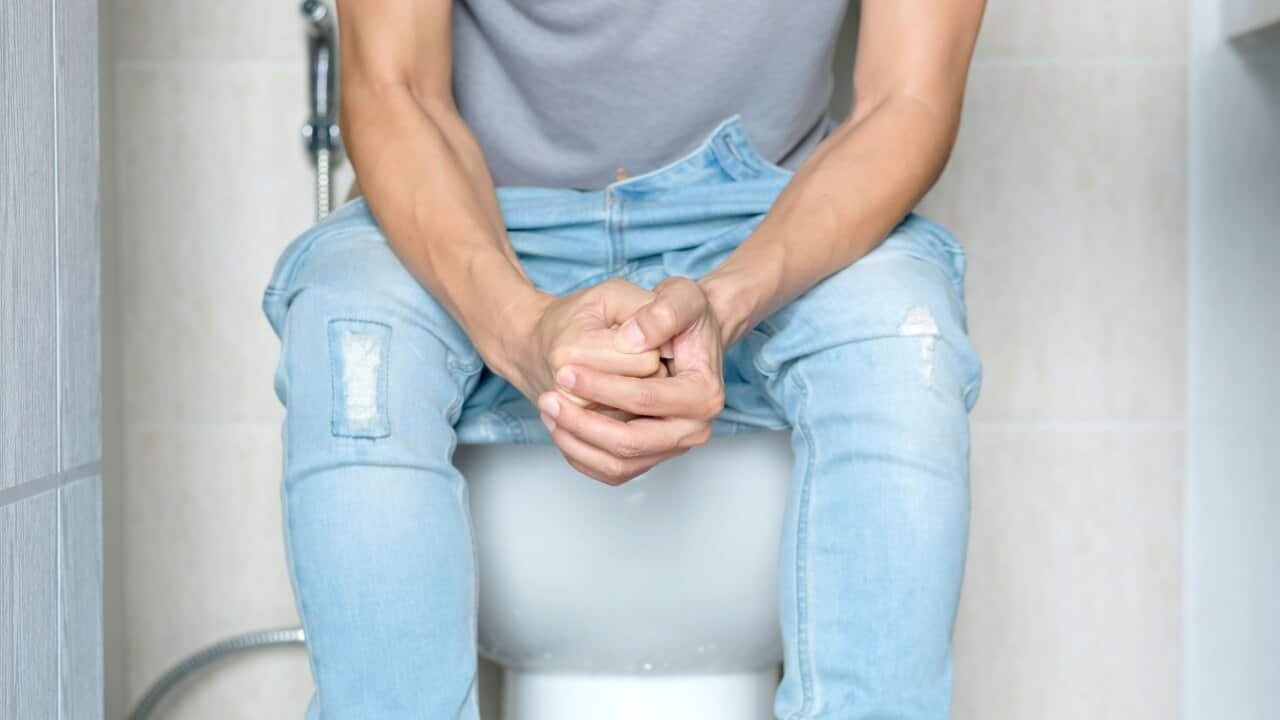Australian comedian Dave Hughes hadn’t touched nicotine since he quit smoking in 1992 — and never imagined he would again.
But in May 2022, the night Anthony Albanese became prime minister, Hughes was at an election party when a friend handed him a vape.
“They told me there was no nicotine in it,” he told SBS Insight.
“I had a suck on it and my toes started tingling.”
“Before I knew it, I was hooked on vaping.”
What began as a "cheeky bad habit" quickly spiralled into addiction, he says.
“Every night I'd say ‘no, I'm not going to do it tomorrow’. And then I was doing breakfast radio, so then I'd find myself at 4.30 in the morning vaping again.

Comedian Dave Hughes said he hid his vaping addiction from his wife and children. Source: AAP / Australian Grand Prix
“I was hiding it from my wife and my children.
“The nicotine just gets straight back into you,” Hughes told SBS Insight host Kumi Taguchi.
Hughes had previously been a heavy smoker and drinker. In 1992 he quit both habits. He has since become a vegan and stopped smoking marijuana and watching adult content.
A habit, a routine or an addiction?
The word 'habit' gets bandied about in conversation often, but the definition is quite complicated when it comes to discerning it from other terms such as 'routine' or 'addiction'.
According to Associate Professor Gina Cleo, a behavioural scientist from Bond University, habits and routines are very different.
“Habits are automatic, and they're triggered by our environments. Whereas routines are something that we might do every day, but we're consciously still thinking about them,” she told Insight.
“For example, driving to the gym might be a habit. But the workout that you do might be a routine because it's different every day.”
Our brains form new habits in an effort to preserve energy for other activities that require more concentration and conscious thought, Associate Professor Cleo adds.
“We make tens of thousands of decisions every single day, and if we had to make each and every one of those decisions consciously, we would be completely exhausted.”
My toes started tingling. Before I knew it, I was hooked.Dave Hughes
Habits also differ from addictions, she explains. While they share similar neurological and behavioural characteristics, they have a key difference: our brain’s reward system.
“When we are enacting a habit, especially in the early days, we get a reward in our brain that helps us to reinforce that habit. And that's why we do it over and over again, " Associate Professor Cleo said.
“In addictions, that reward system is significantly dialled up, and we get a huge rush and we get this big reward.
“Because of that high, we crave that addictive behaviour a lot, which makes it really difficult to break, whether that's gambling or gaming or vaping."
'I was running 150km a week'
Healthy exercise habits are traditionally perceived as positive and disciplined. But for Vanessa Alford, her running quickly evolved from a healthy habit into an obsessive addiction to exercise.
“I just couldn't stop thinking about it. I just wanted more and more and more, even if I didn't feel well, or I was injured,” she told Insight.
“I couldn't actually go without it — you know, suffering withdrawal symptoms, if I missed a session.”
Vanessa’s running addiction took almost everything from her.
“I went from running 150 kilometres a week to not being able to get out of bed. I had to move back in with my parents. I had to stop working because just getting up to brush my teeth took an enormous amount of effort,” she said.

Vanessa Alford became addicted to running and started to suffer withdrawal symptoms if she missed a session. Source: Supplied
“The turning point for me was when my husband and I decided we wanted to start a family. I knew deep down that I wasn't fertile, that I hadn't been for many years,” Vanessa said.
“I knew that I had two options. Either I would spend thousands of dollars on fertility treatment and probably still not get pregnant. Or I could change my ways and start looking after myself.”
Vanessa reduced the regularity and intensity of her exercise and eventually managed to put on weight. She now has two little girls and runs around 50km each week.
"The difference now is I don't feel the urge to push myself to the extreme. I feel fulfilled even with a 30-minute run," she said.
The steps to creating new habits
Associate Professor Cleo says creating new, positive habits is key to kicking bad ones.
"The first step is to decide on a goal, to be really be firm in what you want to do. The second step is to choose a simple action that's going to move you towards that goal.
"The third step is to pair that behaviour with something in your environment, so that could be the time of day, the place that you're in, something that you've just done beforehand.
"And then once you encounter that trigger in your environment, actually do the habit."
Finally, it's about monitoring your progress with a habit tracker app, which can give us the reward we crave, she says.
The more complex the behaviours, the longer the habit will take to create, but she estimates the average time is around 66 days or about 10 weeks.
Kicking bad habits can take even longer, she adds.
"I've seen people kick a habit after just one day, and others have taken years, if not decades."
Hughes managed to kick vaping just as the federal government announced it would be banning the importation of non-prescription vaping products.
But he says the driving force behind him kicking a nicotine dependency for the second time wasn't the government crackdown.
“My wife was very keen for me to quit. She wants me to stay alive, which I appreciate,” he quipped.
“She thought it was a midlife crisis. And maybe it was.”
Readers seeking support for mental health can contact Beyond Blue on 1300 22 4636. More information is available at. supports people from culturally and linguistically diverse backgrounds.













